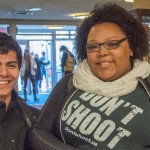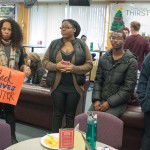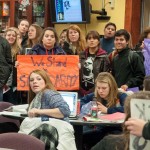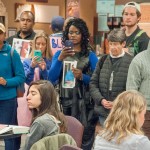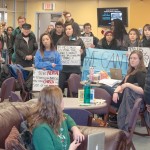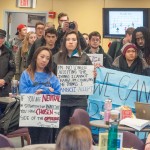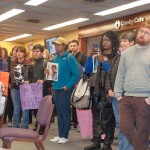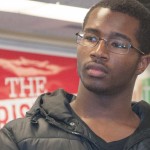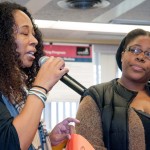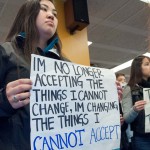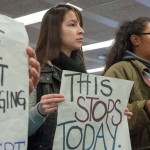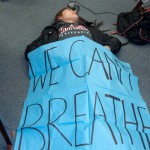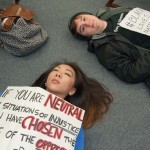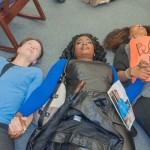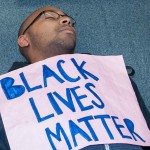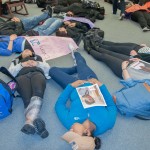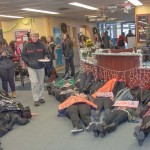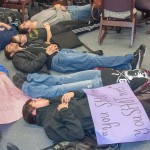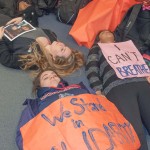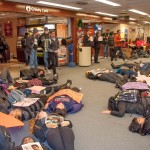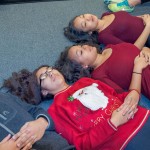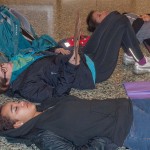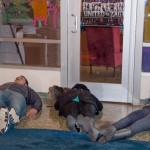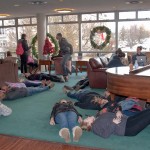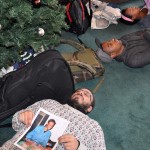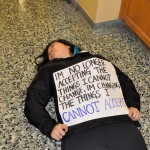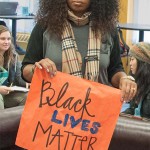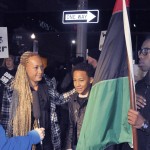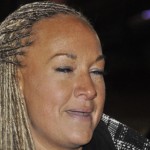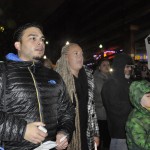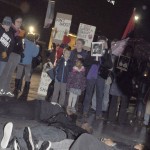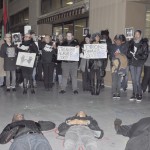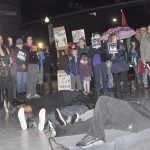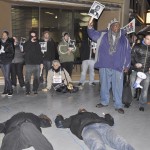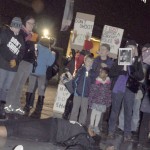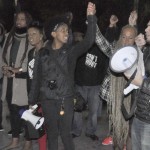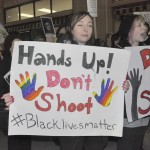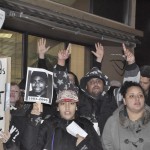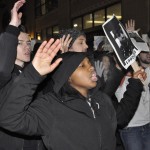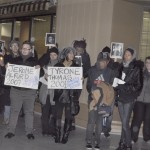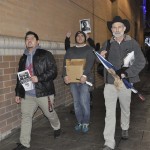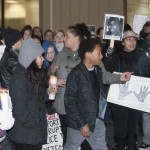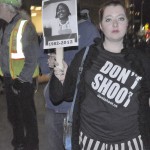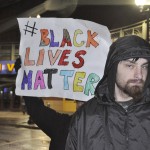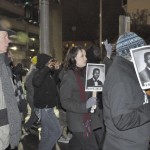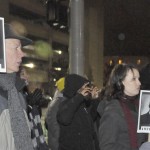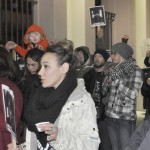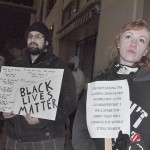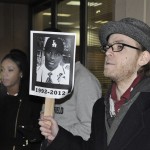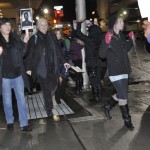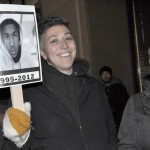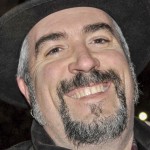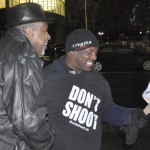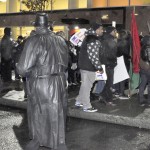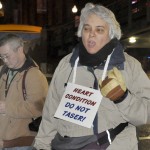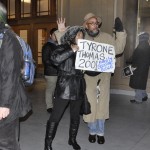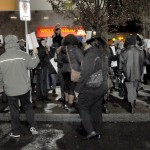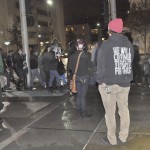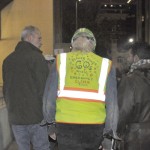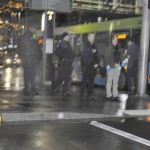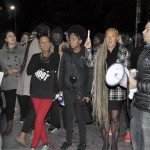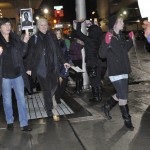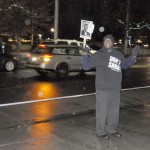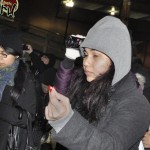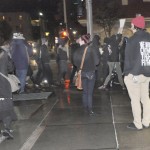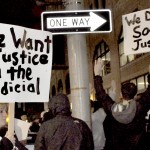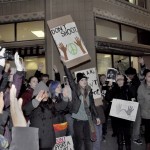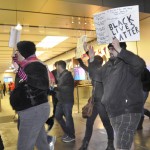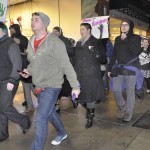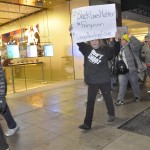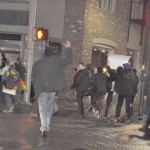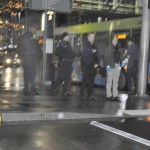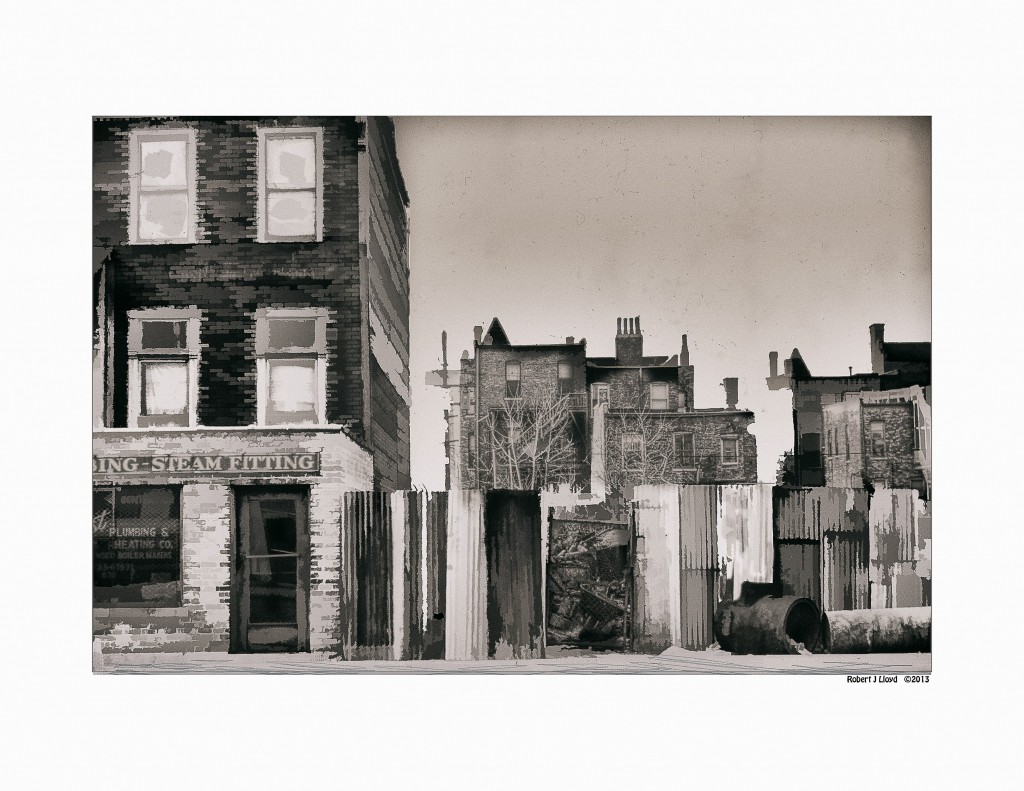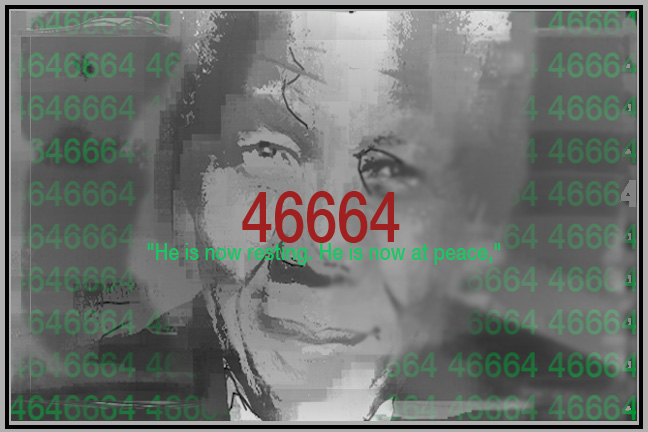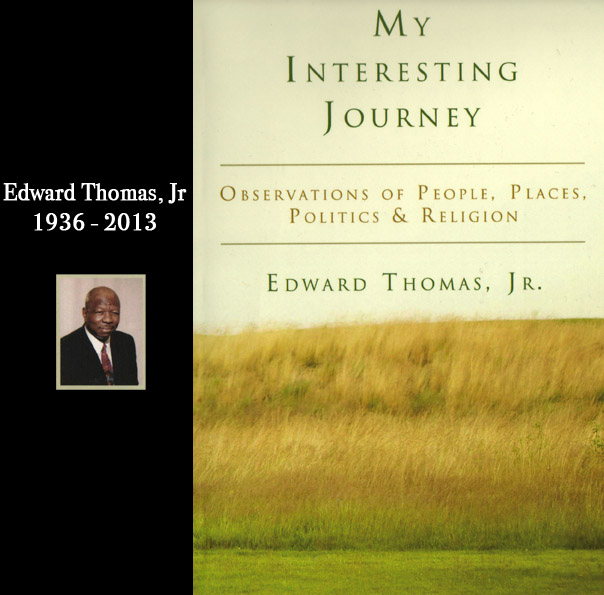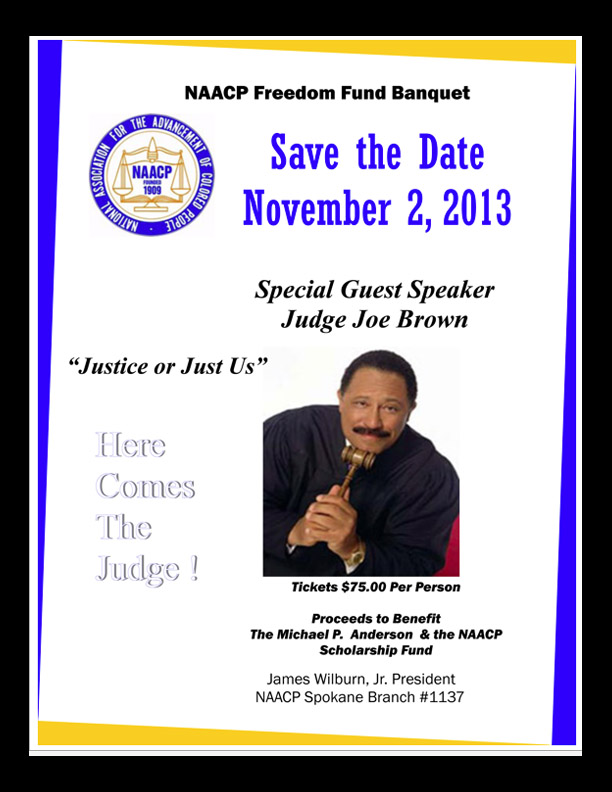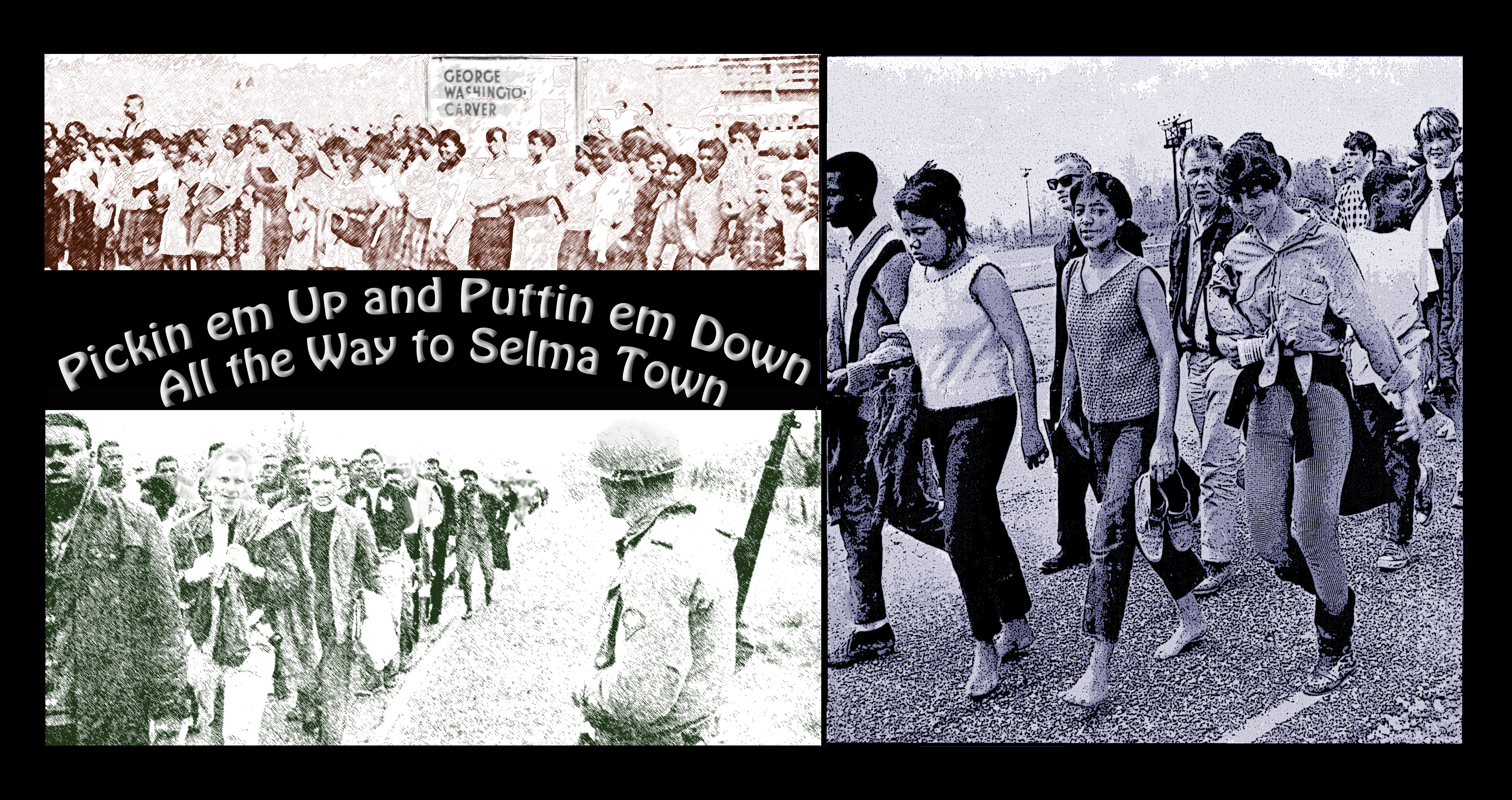The Black Student Union at Gonzaga University sponsored a demonstration on December 11, 2014, to stand in solidarity with communities across America against police misconduct.
Category Archives: Black Issues
Spokane Solidarity with Ferguson MO
After the unjust decision by the grand jury, newly elected Spokane NAACP President Rachel Dolezal called for a solidarity rally at City Hall and a march through the downtown business district. Guesstimates of participants ran from 100 to 280. The City Hall Plaza was closed. Demonstrators gathered on the corner in front of the City Hall building. Young African American men lay down on the ground symbolically representing the corpses of Black youth in America’s streets. The group was largely made up of college students including African Americans, Mecha members, Asian and white students. Members of the Spokane Socialist Alternative were represented, as was PJALS and GBLT. Absent Without Leave were the usual participants in Martin Luther King Day march – politicians, preachers and institutional representatives. And maybe that was a good thing. With new leadership coming from a younger generation grassroots organizing may begin.
Add your comments and let us know where Spokane should go from here.
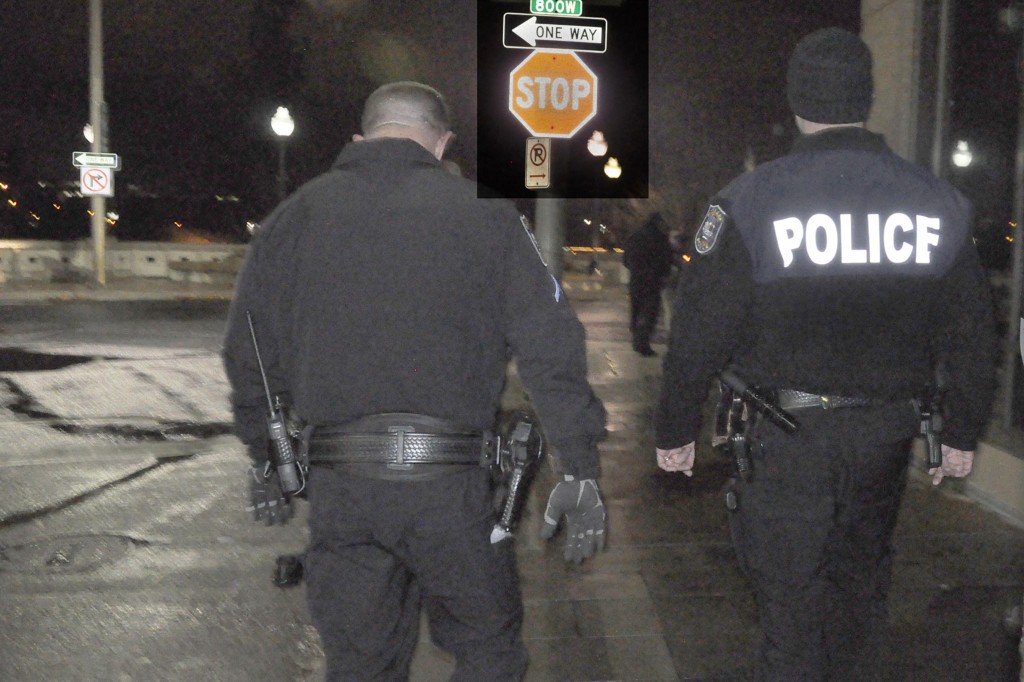 Add your comments and let us know where Spokane should go from here.
Add your comments and let us know where Spokane should go from here.
MLK, Jr. Lecture: Dr King for the 21st Century
Michael Eric Dyson, Sociology Professor and Media Icon
Wednesday, January 29, 7:00 p.m.
To be video streamed from Washington State University Pullman WA
to the Spokane Academic Center Room 245 at 7:00 pm
The Spokane Academic Center address is 412 E Spokane Falls Blvd.
For more information contact Yvonne Montoya Zamora at montoyazamora@wsu.edu or 509.358.7554.
Please feel free to forward.
Yvonne
Black America Is Still Operating Same Way It Did In 1950s
The Black Star Project
- Founded by Phillip Jackson in 1996, The Black Star Project is an educational reform organization in the United States. Its focus is on eliminating the racial academic achievement gap by involving parents and communities in the education of children. (Wikipedia)
Will Globalization Destroy Black America?
Phillip Jackson, Executive Director
The lack of response to globalization by Black America is frightening and troubling. While much of the world has adapted to the new-world economy and new-world standards of existence, most of Black America is still operating much the same way it did in the 1950s and 1960s. But now, throughout Black communities in America, there is a whisper campaign by Black people who don’t know each other and Black people who live in different parts of the country, saying to each other, “We are in trouble!” We know it and the rest of the world knows it! Black America, as we know it, is in danger of not surviving globalization.
In the 21st century, there are only two kinds of people. Not Black or White, or rich or poor, or foreign or national. The two kinds of people in the world today are those who are educated and those who are not. Although education has become the new currency of exchange in the 21st century, the old American educational paradigm stopped working decades ago for Black Americans. Simply sending Black children to American schools without a clear purpose or goal has contributed to the demise of the Black community. Black America watched formerly third-world countries catapult over America to become educational super powers while America rested on its old, stale educational laurels and fell way behind much of the world in educational performance. And because Black America unthinkingly depended on the American education system to educate its children, we have fallen way behind.
The solution
The solution to the issue of Black America’s poor response to globalization is to 1) Deconstruct value systems that have caused Black people to arrive at the precipice of non-existence; 2) Construct value systems that will rebuild the Black family as a purveyor of positive values, cultures, mores and education, and re-establish the Black family as the primary and most important social unit of our culture and society; 3) Embrace education as the highest value in the Black community; 4) Effectively manage the negative cultural influences that hugely impact the thinking and actions of Black boys; and 5) Understand that for the rest of existence, change is a required part of the living process. The faster Black America is able to put this plan into action, adopt these new principles and manage change, the more likely we will survive.
Today, many Black people seem to be having “cosmic flashbacks” to our time in slavery, which was the first crude effort at globalization that helped to set the stage for today’s globalization. For years, Black America was buffered from modern globalization by political boundaries and economic barriers. Now globalization has come to our country, our cities, our communities, onto our blocks and into our homes, schools and workplaces. Globalization has happened, whether Black America is ready for it or not. We still have time to make the necessary changes that will guarantee that Black people will survive into the 21st century and that we will thrive in this global economy. But there is not much time. With globalization, Black America has entered into the “Educate or Die” era. In this era, there are only two questions worth answering: “Will we change? Can we survive?” How we emerge from this era is up to us.
Nelson Mandela 1918 – 2013
Tribute To Edward Thomas, Jr
Spokane WA NAACP Freedom Banquet 2013
INTERNS WANTED
WANT TO WORK FOR PRESIDENT OBAMA?
AFRICAN AMERICAN INTERNS WANTED FOR 2013
WHITE HOUSE INTERNSHIP PROGRAM
Washington, DC (BlackNews.com) — The 2013 White House Initiative’s Year-round Internship Program provides current undergraduate and graduate students with an opportunity to learn about African American-focused education policy communications, and outreach at the U.S. Department of Education in Washington, D.C. Responsibilities include, but are not limited to: Collecting and compiling research and data on African American education, institutions and communities; Performing data entry and managing the office database; Greeting and escorting visitors to meetings; Participating in strategic planning and staff meetings and other Department policy briefings and meetings relevant to the work of the Initiative; Responding to constituent inquiries verbally or in writing; and more.
Throughout the course of their internships, students will have the opportunity to attend and potentially lead in the planning and management of meetings, briefings and other special events on the Hill, at the White House and in other federal agencies.
To apply for the 2013 White House Initiative’s Year-round Internship Program, visit:
www.findinternships.com/2013/04/white-house-initiative-year-round-internship-program.html
To search hundreds of other internships, visit:
www.FindInternships.com
-END-
This information has been distributed through BlackPR.com andBlackNews.com, properties owned by Diversity City Media, but the content or opinions expressed within are those of the author and/or represented company or organization.
Need A Black Expert to Interview? Visit www.BlackExperts.com
Did Dr. King Impact Your Life and Work?
Tomorrow, we pay homage to one of America’s most righteous defenders and promoters of civil and human rights: the Reverend Dr. Martin Luther King Jr.
Dr. King was an incredible man who changed the course of American history. He inspired millions to stand up in peaceful protest against discriminatory laws and fought for the greater good of all humanity.
Dr. King’s spirit lives on. After his assassination, millions of people picked up the torch and continued to fight for a better future, carrying our shared movement for social justice into the present day.
To celebrate his life and legacy, we’d like to hear from you. Tell us how Reverend Dr. Martin Luther King Jr. impacted your life and your work.
Did you take part in marches, rallies, and activist work in the 1950s and 1960s? Tell us about it. Have you heard stories about friends or family members who marched with or met Dr. King? We want to hear them.
And if, like me, you weren’t yet born in the 1960s, we want to hear from you, too. Tell us how Dr. King’s work and message has inspired you to fight for civil and human rights today.
Together, we can build a portrait of the impact Dr. King has had on NAACP supporters and America at large. I hope you’ll help us by sharing your story today.
http://action.naacp.org/page/s/mlk-day?
Thank you,
Benjamin Todd Jealous
President and CEO
NAACP
The After Life Of An AAVoice Staff Member

Student Studies in Zambia:
Lorenzo, Master of Arts in Transformational Leadership (MATL)
Lorenzo Herman, S.J. is a current student in the Master of Arts program in Transformational Leadership (MATL). We met with Lorenzo recently to learn about his summer trip to Zambia as a part of his internship requirement in the MATL program.
When Lorenzo began the program Fall of 2011, he said that his interest immediately peaked when Dr. Sharon Henderson Callahan, Associate Dean for Academics & Student Life, mentioned in orientation that the internship requirement for the MATL could be fulfilled nationally or internationally through the School’s interdisciplinary options– including through Seattle University’s Nonprofit Leadership, Public Administration, Business and Law programs among others.
For eight weeks this past summer, Lorenzo lived in, explored and researched in Lusaka, the capital city of Zambia, while traveling to other cities within the country on assignment. Lorenzo was based within the Jesuit Centre for Theological Reflection in Lusaka, a centre highly respected throughout Africa for its focus on advocacy for social conditions, faith and justice, outreach and economic efforts. Centre founder, Peter Henriot, S.J., has taught on social analysis at Seattle University School of Theology and Ministry over the years, and his social analysis method is used in the Master of Arts programs in Transformational Leadership, Pastoral Studies, and Transforming Spirituality as well as the Master of Divinity program.
The Centre, along with 26 other organizations that make up the Civil Society Constitution Coalition, is working rigorously with the Zambian government on the first draft of their Constitution and meets weekly at the Centre. Prior to his visit, Lorenzo had studied the Constitution at length, and upon his arrival attended meetings with key political figures and stakeholders. In the Constitutional framework, one priority was to include clauses of non-discrimination, including for individuals that have disabilities. The Coalition was finding that the families of individuals with disabilities were directly and indirectly affected by the Constitution, and needed explicit clauses of inclusivity and equality that were monitored and enforced in the community. There were not any representatives from the special needs population or service organizations in the Coalition at that time and some research was needed to further their work on the Constitution.
Lorenzo set out to visit the Ng’ombe compound in Lusaka as a part of this research. Many children throughout Zambia struggle with autism, learning disabilities, cerebral palsy, and down syndrome, among other special needs. There is a special needs school within Ng’ombe called Little Assisi Day School, run by an Irish Franciscan sister, Sister Helen Scully, who also has a background in special needs education. The staff at the school do far more than teach–providing extensive support to mothers and special needs children in the community: from teaching, to healthcare, to home visits, to providing basic supplies for the families.
Lorenzo visited the School and spoke extensively with its staff–asking if he might be able to interview the mothers of special needs children to find out more about their experiences of medical and social systems in Zambia to provide recommendations to the Centre and Coalition in their work on the country’s Constitution. Lorenzo then interviewed 18 mothers, with the support of two incredible teachers at Little Assisi: Edith and Paula. Each mother that Lorenzo interviewed worked intermittently while living in the community, had 0-6 years of education, had high hopes for their children, families and community, and all experienced some form of discrimination, shame and guilt from their communities because of their children’s struggle. Some reoccurring themes in their stories included housing needs, the lack of food and medical care, desire for self-empowerment and entrepreneurship, and hopes for employment and better transportation. It took two days for Lorenzo to type out 55 pages of notes from these interviews, which he then presented to colleagues from the Centre for evaluation. After evaluating themes as well as their subtexts/contexts that illuminate further their similarities and differences, Lorenzo drafted a succinct list of recommendations for the Centre and Coalition in their work.
This experience is close to both heart and home for Lorenzo, since his sister Leslie was born with hydrocephaly and cerebral palsy, and has experienced multiple surgeries and medical treatments over her 26 years. She currently participates in integrated educational programs and social programs in the community, while benefiting from disability benefits in the United States. Lorenzo shared throughout his interviews of special needs children’s mothers, he often thought of his own mother and her strength and struggle in supporting his dear sister.
Below are photographs from Lorenzo’s trip.
Lorenzo presented his qualitative research study entitled “The Mothers of Children With Learning Disabilities in Lusaka, Zambia” at the School on Thursday, November 29th, from 4:30-5:30pm. The study’s objective was to use the collected information and to make recommendations to the Jesuit Centre of Theological Reflection and to those local and national disability advocacy groups to facilitate making recommendations to reduce the burden of disability discrimination and stigma in Zambia. The focus of this research study was to learn how mothers who have children with a learning disability are affected by their families, faith communities, medical and social systems.
FRESH OFF THE PRESS!
Since we interviewed Lorenzo, he has been elected as President of the National Black Catholic Seminarians Association (NBCSA), which seeks to contribute to the wellbeing of candidates for priesthood and religious life, with an emphasis on Black American, African, Afro-Caribbean, and Afro-Latino candidates preparing to serve the Church in the United States and its territories. The Association is an affiliate of the National Black Catholic Clergy Caucus. The National Black Catholic Seminarians Association also cooperates with the National Black Sisters Conference.

From the Soweto Market (above and below)


Lorenzo comments on the above photo:
“I was walking home one day when I came upon these two boys in front of me. It was endearing to see the public affection they have for each other. They were inseparable and having a great time. I could not understand what they were saying because they were speaking Nyanja but their body language was endearing, playful, and sincere.”

Lorenzo shares about this photo, above:
“I thanked the wonderful lady next to me who let me help sell her fish for a while. She thought I was weird for asking. — at Soweto Market.”

